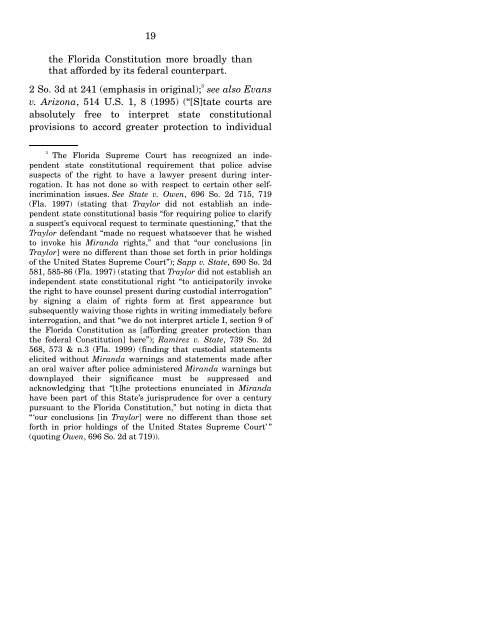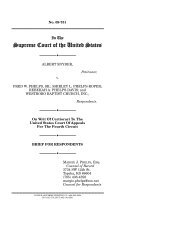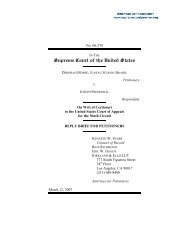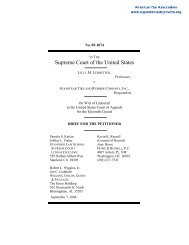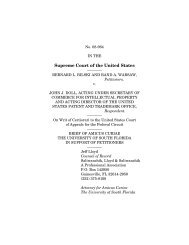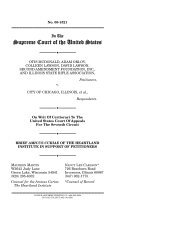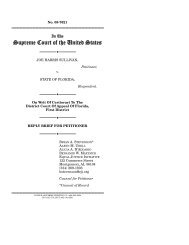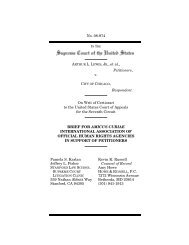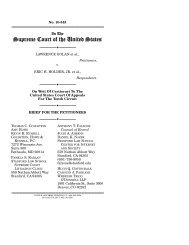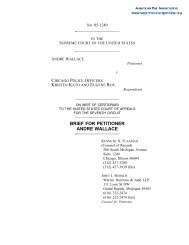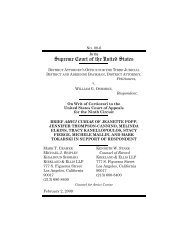Brief of respondent for Florida v. Powell, 08-1175 - Oyez
Brief of respondent for Florida v. Powell, 08-1175 - Oyez
Brief of respondent for Florida v. Powell, 08-1175 - Oyez
You also want an ePaper? Increase the reach of your titles
YUMPU automatically turns print PDFs into web optimized ePapers that Google loves.
19<br />
the <strong>Florida</strong> Constitution more broadly than<br />
that af<strong>for</strong>ded by its federal counterpart.<br />
2 So. 3d at 241 (emphasis in original); 3 see also Evans<br />
v. Arizona, 514 U.S. 1, 8 (1995) (“[S]tate courts are<br />
absolutely free to interpret state constitutional<br />
provisions to accord greater protection to individual<br />
3<br />
The <strong>Florida</strong> Supreme Court has recognized an independent<br />
state constitutional requirement that police advise<br />
suspects <strong>of</strong> the right to have a lawyer present during interrogation.<br />
It has not done so with respect to certain other selfincrimination<br />
issues. See State v. Owen, 696 So. 2d 715, 719<br />
(Fla. 1997) (stating that Traylor did not establish an independent<br />
state constitutional basis “<strong>for</strong> requiring police to clarify<br />
a suspect’s equivocal request to terminate questioning,” that the<br />
Traylor defendant “made no request whatsoever that he wished<br />
to invoke his Miranda rights,” and that “our conclusions [in<br />
Traylor] were no different than those set <strong>for</strong>th in prior holdings<br />
<strong>of</strong> the United States Supreme Court”); Sapp v. State, 690 So. 2d<br />
581, 585-86 (Fla. 1997) (stating that Traylor did not establish an<br />
independent state constitutional right “to anticipatorily invoke<br />
the right to have counsel present during custodial interrogation”<br />
by signing a claim <strong>of</strong> rights <strong>for</strong>m at first appearance but<br />
subsequently waiving those rights in writing immediately be<strong>for</strong>e<br />
interrogation, and that “we do not interpret article I, section 9 <strong>of</strong><br />
the <strong>Florida</strong> Constitution as [af<strong>for</strong>ding greater protection than<br />
the federal Constitution] here”); Ramirez v. State, 739 So. 2d<br />
568, 573 & n.3 (Fla. 1999) (finding that custodial statements<br />
elicited without Miranda warnings and statements made after<br />
an oral waiver after police administered Miranda warnings but<br />
downplayed their significance must be suppressed and<br />
acknowledging that “[t]he protections enunciated in Miranda<br />
have been part <strong>of</strong> this State’s jurisprudence <strong>for</strong> over a century<br />
pursuant to the <strong>Florida</strong> Constitution,” but noting in dicta that<br />
“‘our conclusions [in Traylor] were no different than those set<br />
<strong>for</strong>th in prior holdings <strong>of</strong> the United States Supreme Court’ ”<br />
(quoting Owen, 696 So. 2d at 719)).


